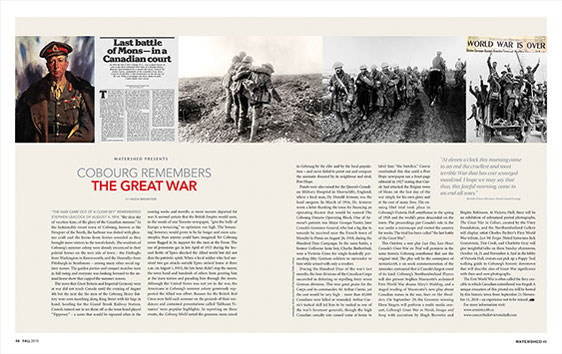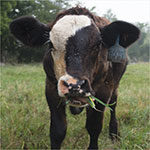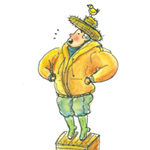
“At eleven o’clock this morning came to an end the cruellest and most terrible War that has ever scourged mankind. I hope we may say that thus, this fateful morning, came to an end all wars.”
British Prime Minister David Lloyd George
“THE WAR CAME OUT OF A CLEAR SKY” REMEMBERED STEPHEN LEACOCK OF AUGUST 4, 1914, “the clear sky of vacation time, of the glory of the Canadian summer.” In the fashionable resort town of Cobourg, known as the Newport of the North, the harbour was dotted with pleasure craft and the horns from ferries sounded as they brought more visitors to the town’s hotels. The residents of Cobourg’s summer colony were already ensconced in their palatial homes on the west side of town – the Fitzhughs from Washington in Ravensworth, and the Donnellys from Pittsburgh in Strathmore – among many other social registry names. The garden parties and croquet matches were in full swing and everyone was looking forward to the annual horse show that capped the summer season.
The news that Great Britain and Imperial Germany were at war did not reach Canada until the evening of August 4th but the next day the men of the Cobourg Heavy Battery were seen marching along King Street with kit bags in hand, heading for the Grand Trunk Railway Station. Crowds turned out to see them off as the town band played “Tipperary” – a scene that would be repeated often in the coming weeks and months as more recruits departed for war. It seemed certain that the British Empire would soon, in the words of one Toronto newspaper, “give the bully of Europe a trouncing,” so optimism ran high. The ‘trouncing’, however, would prove to be far longer and more catastrophic than anyone could have imagined. Yet Cobourg never flagged in its support for the men at the Front. The use of poisonous gas in late April of 1915 during the Second Battle of Ypres shocked the Allied world but did not dim the patriotic spirit. When a local soldier who had survived two gas attacks outside Ypres arrived home at three a.m. on August 1, 1915, the late hour didn’t stop the mayor, the town band and hundreds of others from greeting him at the train station and parading him through the streets. Although the United States was not yet in the war, the Americans in Cobourg’s summer colony generously supported the Allied war effort. Bazaars for the British Red Cross were held each summer on the grounds of their residences and costumed presentations called ‘Tableaux Vivantes’ were popular highlights. In reporting on these events, the Cobourg World noted the generous sums raised in Cobourg by the elite and by the local population – and never failed to point out and compare the amounts donated by its neighbour and rival, Port Hope.
Funds were also raised for the Queen’s Canadian Military Hospital in Shorncliffe, England, where a local man, Dr. Donald Armour, was the head surgeon. In March of 1916, Dr. Armour wrote a letter thanking the town for financing an operating theatre that would be named The Cobourg Ontario Operating Block. One of Armour’s patients was Major Georges Vanier, later Canada’s Governor General, who lost a leg due to wounds he received near the French town of Monchy-le-Preux on August 26, 1918, during the Hundred Days Campaign. In the same battle, a former Colborne farm boy, Charlie Rutherford, won a Victoria Cross for single-handedly persuading fifty German soldiers to surrender to him while armed with only a revolver.
During the Hundred Days of the war’s last months, the four divisions of the Canadian Corps succeeded in defeating or repelling forty-seven German divisions. This won great praise for the Corps and its commander, Sir Arthur Currie, yet the cost would be very high – more than 45,000 Canadians were killed or wounded. Arthur Currie’s tactical skill led him to be ranked as one of the war’s foremost generals, though the high Canadian casualty rate caused some at home to label him “the butcher.” Currie overlooked this slur until a Port Hope newspaper ran a front-page editorial in 1927 stating that Currie had attacked the Belgian town of Mons on the last day of the war simply for his own glory and at the cost of many lives. The ensuing libel trial took place in Cobourg’s Victoria Hall courthouse in the spring of 1928 and the world’s press descended on the town. The proceedings put Canada’s role in the war under a microscope and riveted the country for weeks. The trial has been called “the last battle of the Great War”.
This October, a new play Last Day, Last Hour: Canada’s Great War on Trial will premiere in the same historic Cobourg courthouse that saw the original trial. The play will be the centerpiece of Armistice18, a six-week commemoration of the Armistice centennial that is Canada’s largest event of its kind. Cobourg’s Northumberland Players will also present Stephen Massicotte’s acclaimed First World War drama Mary’s Wedding, and a staged reading of Massicotte’s new play about Canadian nurses in the war, Stars on Her Shoulders. On September 29, the Grammy-winning Elora Singers will perform a multi-media concert, Cobourg’s Great War in Words, Images and Song with narration by Hugh Brewster and Brigitte Robinson. At Victoria Hall, there will be an exhibition of colourized period photographs, The Great War in Colour, created by the Vimy Foundation, and the Northumberland Gallery will display artist Charles Pachter’s First World War tribute, Lest We Forget. Noted historians Jack Granatstein, Tim Cook, and Charlotte Gray will give insightful talks on three Sunday afternoons, October 14, 21 and November 4. And in the lobby of Victoria Hall, visitors can pick up a Poppy Trail walking guide to Cobourg’s historic downtown that will describe sites of Great War significance with then-and-now photographs.
The First World War is often called the fiery crucible in which Canadian nationhood was forged. A unique evocation of this pivotal era will be hosted by this historic town from September 21-November 11, 2018 – an experience not to be missed. For more information visit:
www.armistice18.ca
www.concerthallatvictoriahall.com
Story by:
Hugh Brewster




